-
 Bitcoin
Bitcoin $81,560.5117
-5.51% -
 Ethereum
Ethereum $1,771.5096
-6.33% -
 Tether USDt
Tether USDt $0.9997
-0.02% -
 XRP
XRP $2.0181
-5.66% -
 BNB
BNB $586.3042
-2.90% -
 USDC
USDC $0.9999
-0.01% -
 Solana
Solana $114.4035
-11.78% -
 Dogecoin
Dogecoin $0.1574
-8.81% -
 TRON
TRON $0.2356
-1.07% -
 Cardano
Cardano $0.6304
-7.98% -
 Toncoin
Toncoin $3.5817
-10.14% -
 UNUS SED LEO
UNUS SED LEO $9.4001
0.05% -
 Chainlink
Chainlink $12.4964
-9.88% -
 Stellar
Stellar $0.2554
-5.72% -
 Avalanche
Avalanche $17.9353
-7.12% -
 Sui
Sui $2.2095
-9.36% -
 Shiba Inu
Shiba Inu $0.0...01210
-4.11% -
 Hedera
Hedera $0.1588
-8.41% -
 Polkadot
Polkadot $3.9938
-3.88% -
 Litecoin
Litecoin $81.5008
-4.91% -
 MANTRA
MANTRA $6.3620
0.67% -
 Bitcoin Cash
Bitcoin Cash $295.0277
-4.58% -
 Dai
Dai $0.9999
0.01% -
 Bitget Token
Bitget Token $4.4599
-2.73% -
 Ethena USDe
Ethena USDe $0.9994
-0.05% -
 Pi
Pi $0.5677
-16.47% -
 Monero
Monero $209.1420
-4.72% -
 Hyperliquid
Hyperliquid $11.3307
-18.13% -
 Uniswap
Uniswap $5.6900
-8.31% -
 Aptos
Aptos $4.9771
-7.48%
Bitcoin wallet address creation and security management
Bitcoin wallets store private keys, not Bitcoin; losing these keys means losing your funds, so secure storage is crucial for protecting your cryptocurrency.
Mar 31, 2025 at 10:56 pm
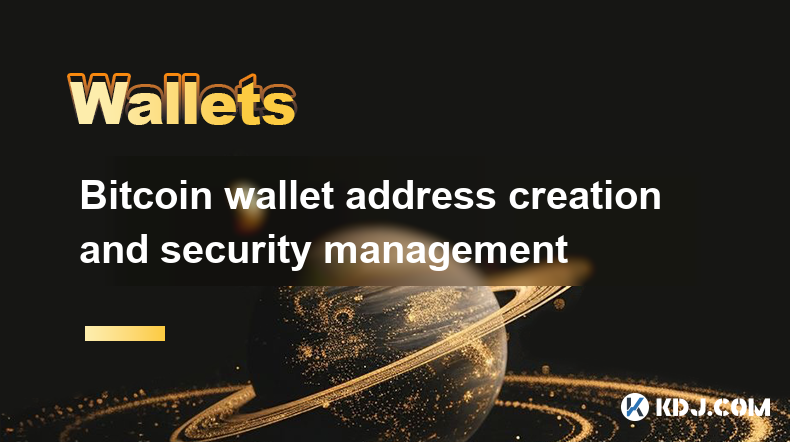
Understanding Bitcoin Wallet Addresses
A Bitcoin wallet doesn't store Bitcoin directly. Instead, it stores private keys which are long strings of characters. These keys grant access to your Bitcoin. Your public key, derived from the private key, is used to generate your Bitcoin wallet address, a unique identifier similar to a bank account number. This address is what you share with others to receive Bitcoin. Losing your private key means losing access to your Bitcoin – there's no recovery. Therefore, securing your private key is paramount.
Creating a Bitcoin Wallet Address: Methods and Considerations
There are several ways to create a Bitcoin wallet address, each with its own security implications.
Using a Software Wallet: Software wallets, like Electrum or Exodus, are downloaded onto your computer or mobile device. They generate a new address each time you receive Bitcoin, enhancing privacy. Security depends heavily on the software's security features and your computer's security.
Using a Hardware Wallet: Hardware wallets, such as Ledger or Trezor, are physical devices that store your private keys offline. They are generally considered the most secure option, as they are not susceptible to malware or online attacks.
Using an Online/Exchange Wallet: Online wallets provided by exchanges like Coinbase or Binance are convenient but expose your funds to the security risks of the exchange itself. Consider the exchange's reputation and security measures before using this method.
Using a Paper Wallet: A paper wallet involves generating your private and public keys offline and printing them on paper. This is a secure method if the paper wallet is stored safely, but it lacks the convenience of other options.
Security Management of Your Bitcoin Wallet Address
Protecting your Bitcoin wallet address and associated private keys is crucial to prevent theft or loss of funds. Here are some key security practices:
Strong Passwords: Use strong, unique passwords for all your wallets and related accounts. Avoid reusing passwords across different platforms. Employ a password manager to help you create and manage complex passwords securely.
Two-Factor Authentication (2FA): Enable 2FA whenever possible. This adds an extra layer of security by requiring a second verification code in addition to your password.
Regular Software Updates: Keep your software wallets and operating systems updated to patch security vulnerabilities.
Antivirus and Firewall: Run a reputable antivirus program and firewall on your computer to protect against malware that could steal your private keys.
Secure Storage of Private Keys: Never share your private keys with anyone. Store them securely, whether in a hardware wallet, a password-protected file, or a well-secured paper wallet. Back up your private keys, but do so securely.
Beware of Phishing Scams: Be cautious of phishing emails or websites that try to trick you into revealing your private keys or login credentials. Never click on suspicious links or enter your information on unverified websites.
Offline Storage for Hardware Wallets: If using a hardware wallet, keep it offline and physically secure to prevent theft or unauthorized access.
Regularly Review Transactions: Check your wallet regularly for any unauthorized transactions. If you detect anything suspicious, take immediate action.
Consider Cold Storage: For long-term storage of significant amounts of Bitcoin, cold storage (offline storage of private keys) is highly recommended.
Multiple Addresses: Use multiple Bitcoin addresses for different purposes. This helps limit the impact of a potential security breach.
Understanding the Risks: Different Wallet Types and Their Vulnerabilities
Each type of wallet carries its own set of risks:
Software Wallets: Vulnerable to malware, computer theft, and operating system vulnerabilities. Regular backups and strong security practices are essential.
Hardware Wallets: Generally considered the most secure, but they can be lost or stolen. Physical security is paramount.
Online/Exchange Wallets: Subject to the security of the exchange itself. Exchange hacks or vulnerabilities can result in the loss of your funds.
Paper Wallets: Vulnerable to physical damage, theft, or loss. Proper storage and backups are critical.
Frequently Asked Questions
Q: What happens if I lose my private key?
A: If you lose your private key, you lose access to your Bitcoin. There is no recovery mechanism.
Q: Are hardware wallets completely secure?
A: While hardware wallets are significantly more secure than software wallets, they are not invulnerable. They can be lost, stolen, or damaged.
Q: How often should I back up my wallet?
A: The frequency of backups depends on your risk tolerance and the amount of Bitcoin you hold. Regular backups, at least weekly or monthly, are recommended.
Q: What is a seed phrase, and why is it important?
A: A seed phrase is a list of words that acts as a master key to your wallet. It allows you to restore your wallet if you lose access to your device or private keys. Keep it safe and secure, as it is essential for recovery.
Q: How can I protect myself from phishing scams?
A: Be wary of unsolicited emails or messages requesting your private keys or login credentials. Always verify the authenticity of websites and emails before entering any sensitive information. Never click on suspicious links.
Q: What is the difference between a public key and a private key?
A: Your public key is like your bank account number; you share it to receive Bitcoin. Your private key is like your bank password; it grants you access to your funds. Never share your private key.
Disclaimer:info@kdj.com
The information provided is not trading advice. kdj.com does not assume any responsibility for any investments made based on the information provided in this article. Cryptocurrencies are highly volatile and it is highly recommended that you invest with caution after thorough research!
If you believe that the content used on this website infringes your copyright, please contact us immediately (info@kdj.com) and we will delete it promptly.
- VanEck Has Made a Big Move in Bringing a Binance Coin BNB/USD ETF to the United States
- 2025-04-04 02:25:12
- 3 Low-Cap Altcoins with Insane Potential in 2025: Dawgz AI ($DAGZ), Render (RNDR), and Sei (SEI)
- 2025-04-04 02:25:12
- A major Solana ($SOL) whale has returned to the spotlight after transferring substantial funds to Binance in two separate batches.
- 2025-04-04 02:20:11
- The U.S. Senate Banking Committee has voted to approve Paul Atkins' nomination for the role of Chair of the Securities and Exchange Commission (SEC).
- 2025-04-04 02:20:11
- Pepe Coin (PEPE) Demonstrates Remarkable Growth
- 2025-04-04 02:15:12
- We Asked AI to Predict Litecoin (LTC) Price in Q2 2025 Following Fidelity's Crypto IRA News
- 2025-04-04 02:15:12
Related knowledge
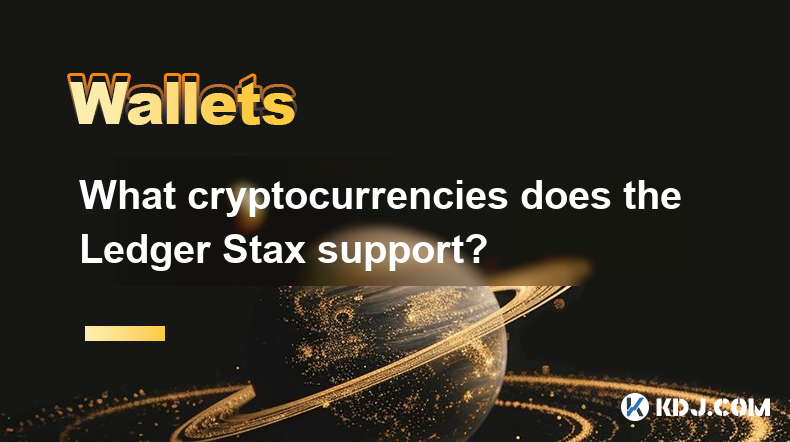
What cryptocurrencies does the Ledger Stax support?
Apr 04,2025 at 02:00am
The Ledger Stax is a highly advanced hardware wallet designed to provide secure storage for a wide range of cryptocurrencies. It is essential for users to understand which cryptocurrencies are supported by the Ledger Stax to ensure they can manage their digital assets effectively. In this article, we will explore the various cryptocurrencies that the Le...
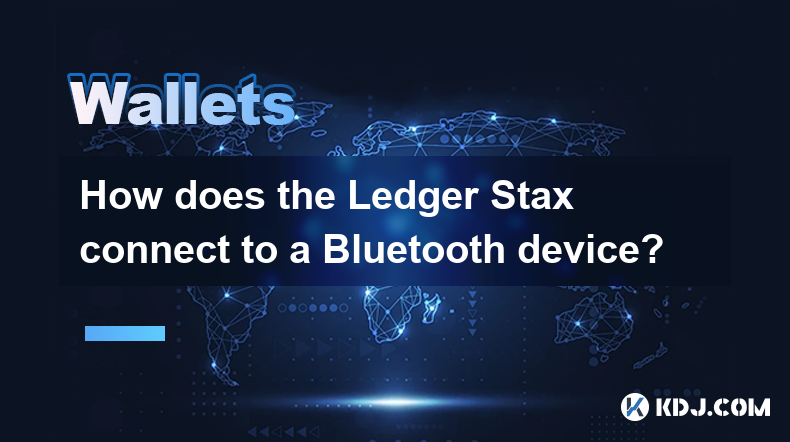
How does the Ledger Stax connect to a Bluetooth device?
Apr 03,2025 at 11:07pm
Introduction to Ledger Stax and Bluetooth ConnectivityThe Ledger Stax is a cutting-edge hardware wallet designed to provide secure storage for your cryptocurrencies. One of its key features is the ability to connect to other devices via Bluetooth, which enhances its usability and convenience. In this article, we will explore in detail how the Ledger Sta...
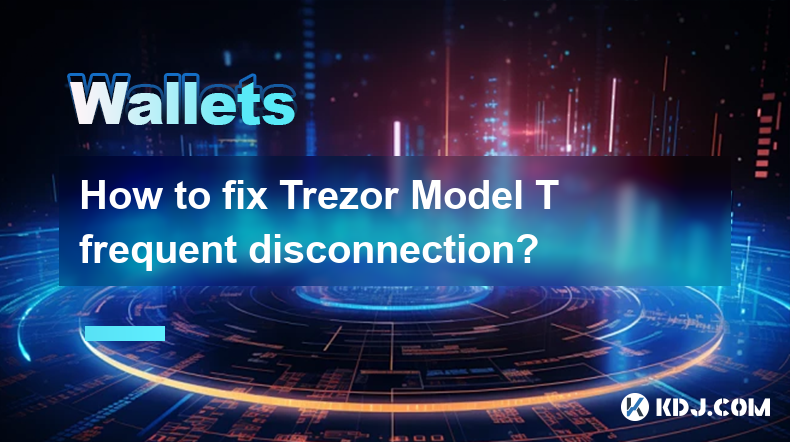
How to fix Trezor Model T frequent disconnection?
Apr 04,2025 at 01:01am
Introduction to Trezor Model T Disconnection IssuesThe Trezor Model T is a popular hardware wallet used by cryptocurrency enthusiasts to securely store their digital assets. However, some users have reported experiencing frequent disconnections, which can be frustrating and potentially compromise the security of their transactions. In this article, we w...
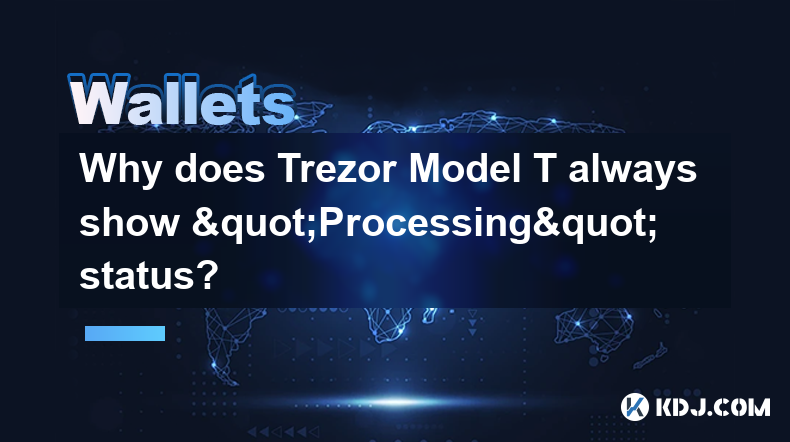
Why does Trezor Model T always show "Processing" status?
Apr 04,2025 at 01:07am
Introduction to Trezor Model TThe Trezor Model T is a popular hardware wallet designed to securely store cryptocurrencies. It is known for its robust security features and user-friendly interface. However, some users have reported encountering a persistent 'Processing' status on their device, which can be frustrating and confusing. This article will exp...
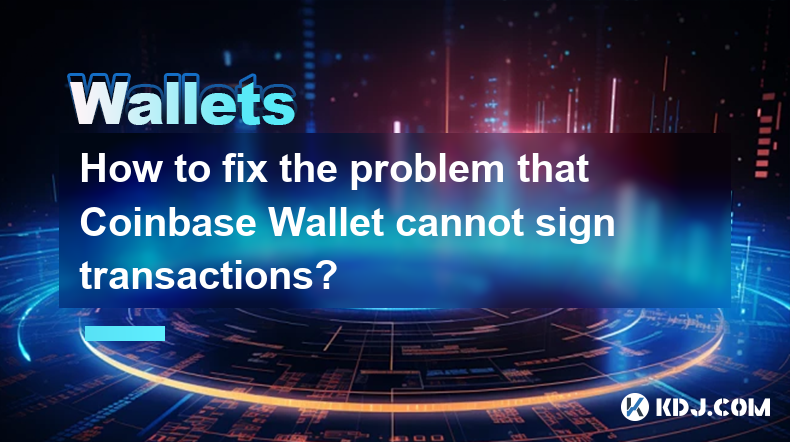
How to fix the problem that Coinbase Wallet cannot sign transactions?
Apr 04,2025 at 02:28am
When using the Coinbase Wallet, users may occasionally encounter issues where they cannot sign transactions. This can be frustrating, especially when you need to move funds or interact with decentralized applications (dApps). In this article, we will explore various solutions to fix the problem of Coinbase Wallet not being able to sign transactions. Und...
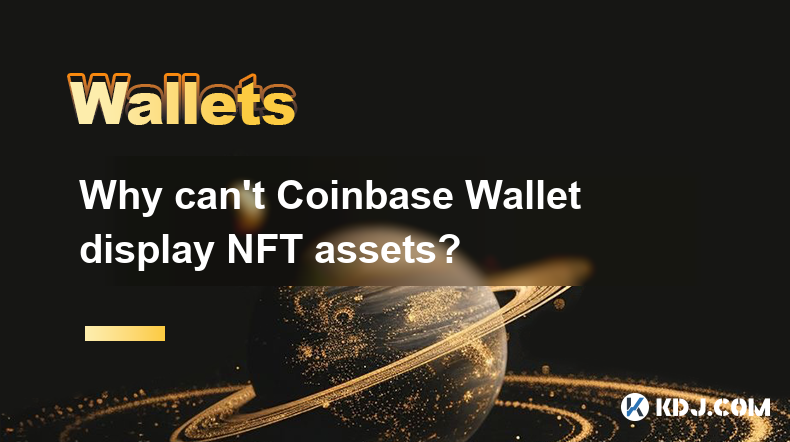
Why can't Coinbase Wallet display NFT assets?
Apr 03,2025 at 10:01pm
Why can't Coinbase Wallet display NFT assets? The inability of Coinbase Wallet to display NFT assets is a common issue among users who are looking to manage their non-fungible tokens directly through the wallet. This problem can stem from several reasons, which we will explore in detail. Understanding these reasons is crucial for users to better manage ...

What cryptocurrencies does the Ledger Stax support?
Apr 04,2025 at 02:00am
The Ledger Stax is a highly advanced hardware wallet designed to provide secure storage for a wide range of cryptocurrencies. It is essential for users to understand which cryptocurrencies are supported by the Ledger Stax to ensure they can manage their digital assets effectively. In this article, we will explore the various cryptocurrencies that the Le...

How does the Ledger Stax connect to a Bluetooth device?
Apr 03,2025 at 11:07pm
Introduction to Ledger Stax and Bluetooth ConnectivityThe Ledger Stax is a cutting-edge hardware wallet designed to provide secure storage for your cryptocurrencies. One of its key features is the ability to connect to other devices via Bluetooth, which enhances its usability and convenience. In this article, we will explore in detail how the Ledger Sta...

How to fix Trezor Model T frequent disconnection?
Apr 04,2025 at 01:01am
Introduction to Trezor Model T Disconnection IssuesThe Trezor Model T is a popular hardware wallet used by cryptocurrency enthusiasts to securely store their digital assets. However, some users have reported experiencing frequent disconnections, which can be frustrating and potentially compromise the security of their transactions. In this article, we w...

Why does Trezor Model T always show "Processing" status?
Apr 04,2025 at 01:07am
Introduction to Trezor Model TThe Trezor Model T is a popular hardware wallet designed to securely store cryptocurrencies. It is known for its robust security features and user-friendly interface. However, some users have reported encountering a persistent 'Processing' status on their device, which can be frustrating and confusing. This article will exp...

How to fix the problem that Coinbase Wallet cannot sign transactions?
Apr 04,2025 at 02:28am
When using the Coinbase Wallet, users may occasionally encounter issues where they cannot sign transactions. This can be frustrating, especially when you need to move funds or interact with decentralized applications (dApps). In this article, we will explore various solutions to fix the problem of Coinbase Wallet not being able to sign transactions. Und...

Why can't Coinbase Wallet display NFT assets?
Apr 03,2025 at 10:01pm
Why can't Coinbase Wallet display NFT assets? The inability of Coinbase Wallet to display NFT assets is a common issue among users who are looking to manage their non-fungible tokens directly through the wallet. This problem can stem from several reasons, which we will explore in detail. Understanding these reasons is crucial for users to better manage ...
See all articles






















































































